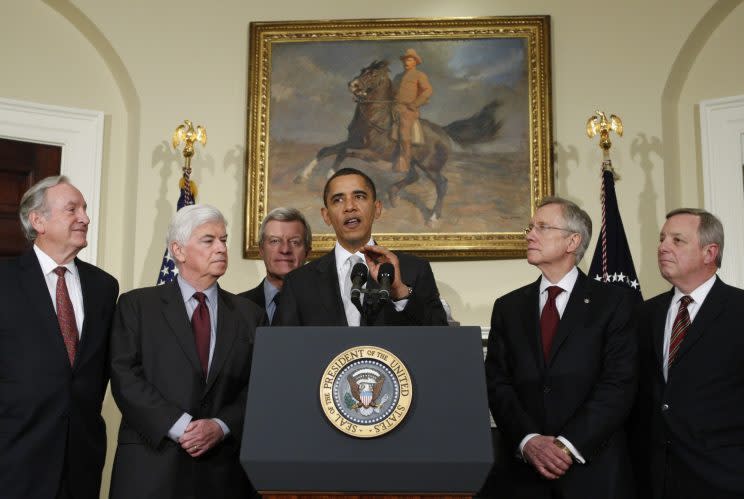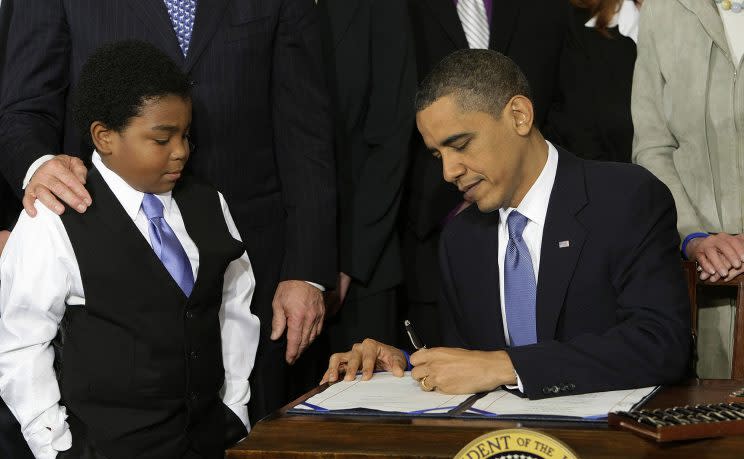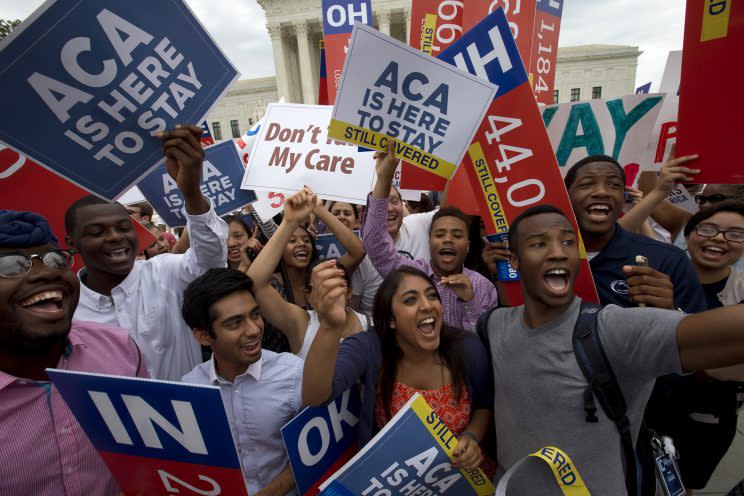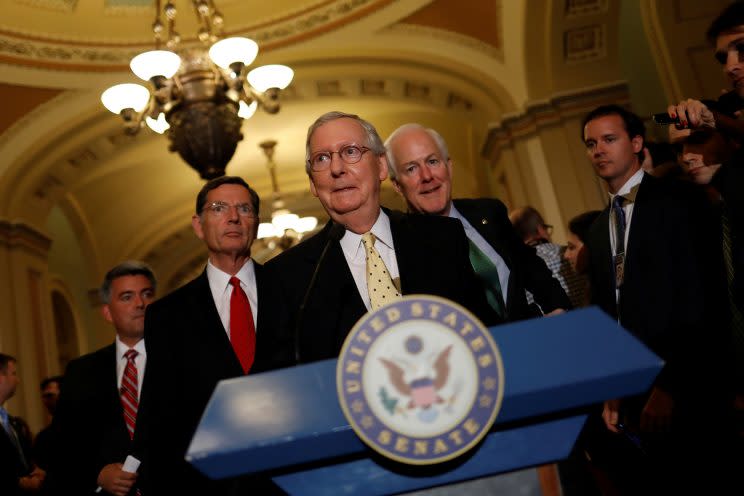These Obama staffers knew just how complicated health care is

WASHINGTON — President Trump had no idea of the morass he was about to get his new administration into with his vow to take up an overhaul of the health care system, an Obama White House aide told Yahoo News a month after the election.
After all, last October Trump had promised voters that if they cast ballots for him, repealing Obamacare would be a snap: “You’re gonna have such great health care at a tiny fraction of the cost, and it’s going to be so easy.” It was something that could be done fast, too, he told America. “We will immediately repeal and replace ObamaCare,” he said in February 2016. “On day one of the Trump Administration, we will ask Congress to immediately deliver a full repeal of Obamacare,” he tweeted in March of that year.
The reality of getting the Affordable Care Act passed and implemented, the aide said, was that it was all-consuming.
“This was an all hands on deck for the legislative team,” a different former senior adviser from the Obama administration told Yahoo News on Tuesday, after Senate Republicans were unable to muster 50 votes for their legislation to repeal and replace Obamacare. “Months upon months upon months of meetings — the legislative team, the Domestic Policy Council, the National Economic Council; from the chief of staff to senior advisors to the president himself — this was all hands on deck for a very sustained period of time because of how hard it was. Because all of us knew that there was a reason why this type of broad health care reform hadn’t been successful notwithstanding 70, 80 years of trying.”
It’s “not the type of issue you can casually visit as part of some kind of theme week that you have. It’s sustained from the president on down,” the former aide said.
It has been a steep learning curve for Trump. Within a month of taking office, he was expressing a new humility on the topic. “Now, I have to tell you, it’s an unbelievably complex subject,” Trump said at a meeting of the National Governor’s Association. “Nobody knew health care could be so complicated.”

But people did know. In the Obama White House, they knew — because they spent eight years dealing with it every day, following an intraparty policy development process stretching back to 2004, and on the heels of more than half a century of failed party efforts to transform the health care system to provide universal coverage.
“Health care is the hardest legislation to move, and the reason it’s so hard is because it’s both the most personal and the most consequential,” the former adviser continued. “This is literally the hardest type of policy to try to enact, and I think you’ve seen the way that’s played out, both in terms of reaction at town halls and the fact that the [Affordable Care] Act has gone from being underwater for seven years to substantially above water. Once you say to people you’re going to change something like health care, people become very, very risk and loss averse, and even if they have mixed opinions about the state of present health coverage, the unknown is rarely seen as better than what they presently have.”
“That’s something we saw in 2009 and 2010, and that’s what the Republican Congress is seeing now,” the adviser added.
It’s a view that was echoed from the Hill. “There’s a reason it took Democrats basically a year to do it,” said Adam Jentleson, who was a top aide to then Senate Majority Leader Harry Reid, D-Nev., during the ACA battles. “They can disagree with us on our politics and the policy decisions we made about health care, but we’re not idiots. We didn’t take a year to do it for fun. That’s just how long it takes — if you’re going to do it in a way that it can actually pass.”
Related slideshow: Protesters across the country oppose GOP’s health care plan >>>
It was the “height of arrogance” for Trump to breeze in and think that something so complex and fraught could be handled quickly “in weeks” without substantial debate or deliberation, he said.
“I always thought it was a mistake for them to go straight into health care repeal instead of doing something like infrastructure or tax cuts,” Jentleson added. “They should have gone with something that would have been an easy win.”
Another former Obama White House aide said that Republicans should take the failure of the repeal and replace efforts, which have eaten up the first half of the year’s legislative calendar and contributed to negative views of the new administration, as a blessing.

“If indeed this bill is actually dead right now, I can’t think of anything that has saved the Republicans in Congress more pain and suffering than the killing of this bill,” said the former aide. “Because as bad as it looks on paper, it would have been a hundred times worse in the implementation. And as frustrated as they are now with Donald Trump’s attention deficit disorder, that would have been a million times worse when he’s overseeing this giant dismantling of a program affecting a fifth of the economy.
“Implementation was something we dedicated enormous manpower and attention to,” the aide added. Far from decreasing after the passage of the Affordable Care Act, the bill’s demands on administration’s time and energy — to say nothing of public good will — remained sky-high throughout the implementation phase, which was run out of the White House and the executive agencies, not Congress.
And all of that played out against a backdrop of a process that had been bipartisan at the conceptual stage, though not when it came to final votes, and drew from ideas already tested in the laboratories of democracy — in this case, Republican Gov. Mitt Romney’s Massachusetts. The Democratic Party had been having a major internal policy debate about how to achieve universal coverage while maintaining the market-based insurance system for decades; it was a major question during the 2008 primary contest, and in the end, Obama wound up drawing on ideas from his Democratic rivals as well as from his advisers and Republicans.
The end product of all this debate and deliberation was the enormously complicated Affordable Care Act, which was carefully calibrated to work within the market-based framework. Take out any single piece of the act, though, and the calibration would start to get thrown off.
“I was pretty convinced that if they didn’t separate repeal and replace, it would never happen. I will confess that it got further than I thought it would,” said one of the former Obama aides. The reason the aide expected repeal and replace to fail is that if there were a better way to achieve broad, affordable, market-based healthcare coverage, the Obama administration would have pursued it. There weren’t going to be dramatically better alternatives offered by the Republicans once they were forced to offer real ones up for passage and implementation rather than legislative show votes. There were only going to be plans that caused people to lose coverage or consumer costs to go up.

“As soon as you separate them and kind of strip away the illusion of — well, there’s this like brilliant, better-than-the-ACA health care plan that’s ready to be put in place — the math doesn’t add up. Ultimately the reason that the ACA was so complicated in the first place was because its approach was: How do you cover everybody without doing single-payer? There wasn’t really an alternate route. This was the alternate route,” said the aide. “And ultimately I think they ran into that reality.”
The promise of a better Republican alternative to Obamacare that didn’t preserve the core of Obamacare was also unrealistic, because Obamacare already incorporated a lot of center-right thinking about how to manage the private individual insurance market.
“Republicans created this myth that there was some centrist, center-right health care reform that was possible that didn’t look a lot like Obamacare, and that’s just false,” Jentleson said. The ACA “preserved the private insurance market. … It is essentially, at its core, a new set of rules and regulations governing the private insurance market, and new subsidies to pay for it and an expansion of Medicaid.”
That said, Democrats — including within the Obama administration — have acknowledged for years that the Affordable Care Act could benefit from legislative tweaks.
“When you do a bill as big as Obamacare, there’s always going to be things that don’t work out as you expected, and you need the flexibility to tweak it and makes changes as the rubber hits the road and policy is implemented,” said Jentleson. “Republicans denied Democrats the ability to make the kind of changes, or even technical fixes, that would have helped improve the bill — mainly out of spite.”
“For Donald Trump personally, it would not be that hard to conceive of a bill that had both Democratic and Republican ideas that actually shored up the health care system quite a bit and made him look amazing,” said the former Obama aide. “Democrats would probably have to choke down what they viewed as some bad policy along the way, but it would be a reasonable deal. And it would be something that would be just light years better in terms of public appreciation and public approval.”

The aide was not optimistic that Trump would take that approach anytime soon, though. “Somebody in the White House has convinced him that everything must be done geared exclusively to the base,” the aide said. “I know there are people in the White House that know better than that, but clearly they’ve been drowned out.”
_____
Read more from Yahoo News:
As McConnell plan fails, will Democrats and Republicans work together to fix health care?
Over 20 members of Congress ask the FBI to review Ivanka Trump’s security clearance
Kamala Harris: The Democratic message is ‘telling the American public we see them’
Coulter won’t back down, sit down or pipe down on Delta seat mishap



